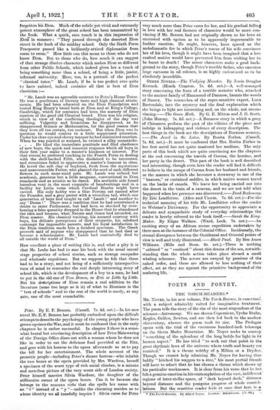OMER NOVELS.—The Undying Monster. By Jessie Douglas Kerrush. (Heath Crouton.
7s. tid. net.)—A, well-managed story concerning tho feats of a terrible monster who, attached to the ancient family of Hammand of Dannow, haunts the woods of Sussex. The researches of the super-sensitive expert, Luna Bartendale, into the mystery and the final explanation which she brings to light are interesting and, on the whole, not uncon- vincing.—The Green Moth. By G. E. Mitten and J. G. Scott. (John Murray. 7s. &I. net.)—A Burmese story in which a gang of Chinamen perform the part of the villains of the piece and indulge in kidnapping and violence of every description. The best things in the book arc the descriptions of Burmese scenery. —The Jewel in the Lotus. By Resit°. Forbes. (Cassell. 7s. 6d. net.)—It must be confessed that Mrs. Rosita Forbes in her first novel has not quite mastered her medium. The only parts of this book which are quite convincing are the chapters at the end concerning the travels of Corona, the heroine, and her party in the desert. This part of the book is well described and interesting, though even here the reader will find it difficult to believe in the escape of Corona from her husband and friends, or the manner in which she becomes a stowaway in one of the " basoors," or curtained saddles, in which native women travel on the backs of camels. We leave her being carried out into the desert in the train of a caravan, and we are not told what happened when her presence was discovered.—Dead Reckontng. By Eric Leadbitter. (Allen and Unwin. 7s. 6d. net.)—For the technical meaning of his title Mr. Leadbitter refers the reader to Webster's Dictionary. For the opportunity to appreciate a delicate and sympathetic study of everyday relationships the reader is hereby referred to the book itself.—Sandi the Ring- Maker. By Edgar Wallace. (Ward, Lock. 7s. net.)—An exciting story of an African rescue expedition undertaken by three men at the instance of the Colonial Office. Incidentally, the eternal divergence between the Occidental and Oriental points of view is well and truly illustrated.—Black Pawl. By Ben Ames Williams. (Mills and Boon. 6e. net.)—There is nothing " cabined " or " confined " about this drama of the sea, notwith- standing that the whole action takes place aboard a small whaling schooner. The actors are swayed by passions of the naked order, and these are allowed to lose nothing of their effect, set as they are against the primitive background.of the seafaring life.


































 Previous page
Previous page